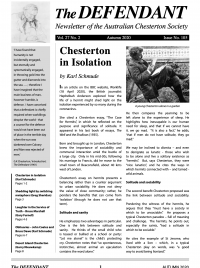Issue: Autumn 2020
In the midst of COVID-19, this issue opens with a topical piece on Chesterton’s ideas about solitude. Greg Sheridan reveals the advantages of switching metaphors in speaking to different audiences. Gary Furnell revisits a neglected Scottish Catholic writer, Bruce Marshall, by looking at his recently reprinted novel, The World, The Flesh, and Father Smith. Karl Schmude contributes two obituaries – one of the Chesterton scholar, John Coates, the other of the Australian poet, Bruce Dawe, while Garry Nieuwkamp’s pick of a Desert Island Chesterton book is his greatest poem, Lepanto (1911).
The selection by Garry Nieuwkamp for the occasional series, Desert Island Chesterton,is Chesterton’s epic poem, ‘Lepanto’, which Dr Nieuwkamp compares, in terms of vast output and the difficulty of being limited to only one work, to the challenge of picking a musical piece by the movie composer, Ennio Morricone.
While it is improbable that Chesterton and the late Australian poet, Bruce Dawe, were known to each other, as Dawe was only 6 years old when Chesterton died in 1936, they had much in common, especially a powerful poetic imagination and a moral vision of ordinary life that prized the most vulnerable human beings.
A notable Chesterton scholar, John Coates, died in England in 2020 at the age of 76. This tribute to his work highlights several of the significant insights in his definitive study, Chesterton and the Edwardian Cultural Crisis (1984).
Gary Furnell analyses the Bruce Marshall novel, The World, The Flesh and Father Smith. Marshall (1899-1987) was a Scottish Catholic writer who, in the 1930s and later, employed humour in a series of novels with religious themes, a number of which were subsequently made into movies.
The Foreign Editor of The Australian, Greg Sheridan, has long admired Chesterton and reveals in this article the lessons he has learnt from Chesterton about adopting unexpected approaches and metaphors in discussing different subjects.
Drawing on the insights of one of Chesterton’s last essays, ‘The Case for Hermits’, the British journalist Hephzibah Anderson has highlighted its timely significance in the Age of Covid. Karl Schmude connects the ideas of Chesterton and Anderson on solitude and its relationship to sanity and sociability.
